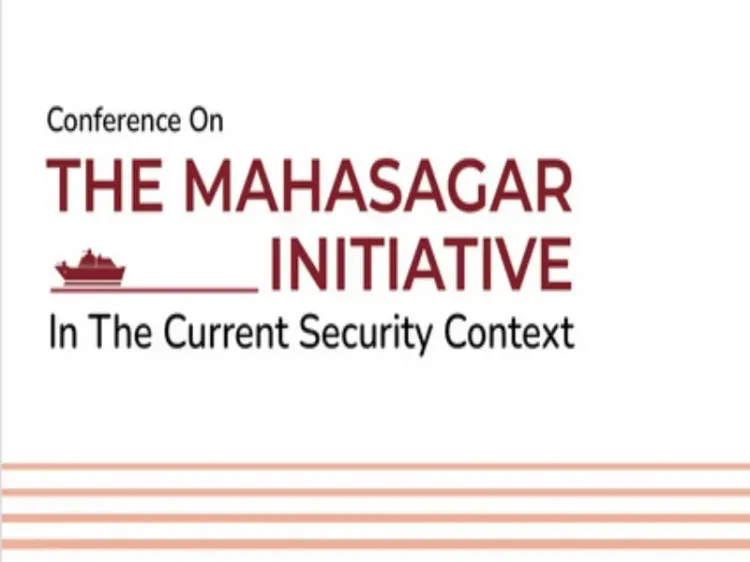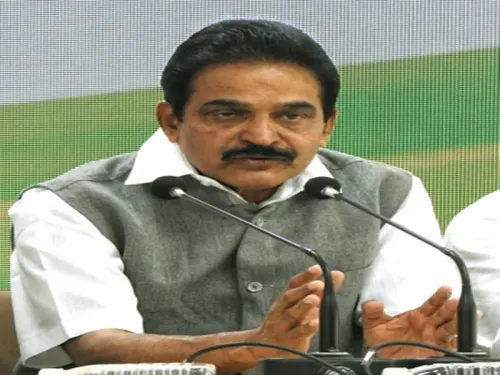Is PM Modi’s Maritime Shift to MAHASAGAR a Strategic Vision?

Synopsis
Key Takeaways
- MAHASAGAR expands India's maritime focus from regional to global.
- The initiative aims to promote shared prosperity and security across oceans.
- It enhances India's role as a leader in maritime cooperation.
- MAHASAGAR includes collective security and regional coordination.
- It showcases India's strategic partnerships, particularly with Mauritius.
New Delhi, May 23 (NationPress) In a pivotal moment for India's maritime diplomacy, the nation has introduced its enhanced oceanic strategy under the title of ‘MAHASAGAR’ (Mutual and Holistic Advancement for Security and Growth Across Regions). This initiative signifies a major advancement from Prime Minister Narendra Modi’s initial SAGAR doctrine. The new strategy showcases a transition from a regional emphasis on the Indian Ocean to a comprehensive global maritime perspective.
The strategy was at the forefront of a high-profile dialogue in the capital, which convened leading defence experts, diplomats, and scholars for a conference named “The Mahasagar Initiative in the Current Security Context,” organized by the Chintan Research Foundation.
During the keynote address, Admiral R.K. Dhowan (Retd), former Chief of Naval Staff, underscored India's expanding maritime capabilities:
“The Indian Navy is fully equipped to deter threats, maintain control over ocean spaces, and safeguard the nation's interests through operational maneuvers, sea denial, and sea control. Our preparedness also encompasses coastal defence and asymmetric warfare scenarios.”
Shishir Priyadarshi, President of the Chintan Research Foundation, reflected on the evolution from SAGAR to Mahasagar:
“SAGAR—Security and Growth for All in the Region—was based on the understanding that economic advancement cannot occur without peace and stability. It initially focused on the Indian Ocean Region but laid the foundation for a more extensive global strategy.”
Over the last decade, India has progressively broadened its maritime partnerships and blue economy initiatives. Former Ambassador Rajiv Bhatia emphasized SAGAR's role in strengthening regional connections and developmental outreach:
“SAGAR has propelled India’s initiatives to forge regional alliances and enhance maritime development, particularly in the blue economy.”
India is now aiming for a more ambitious global maritime framework. Prof. Chintamani Mahapatra, Founder and Chairperson of the Kalinga Institute of Indo-Pacific Studies, pointed out the transition:
“MAHASAGAR transcends SAGAR—it aspires for shared prosperity and security across all oceans. PM Modi envisions a world where every nation with maritime boundaries benefits equally from peace, trade, and sustainability.”
Jayant Misra, Executive Committee Member of MP-IDSA, elaborated on the broadened scope of Mahasagar: “The scope of MAHASAGAR is more extensive. It now encompasses collective security, regional coordination, and enhanced global maritime partnerships.”
Emphasizing the diplomatic significance, Ruchita Beri, Senior Fellow at VIF, noted the strategic context of the initiative's announcement:
“Launching the Mahasagar initiative from Mauritius highlighted the country’s strategic relevance and symbolic partnership in India’s maritime outreach.”
Prof. Gulshan Sachdeva, Coordinator at DAKSHIN-RIS, offered a wider perspective:
“While SAGAR concentrated on the Indian Ocean, MAHASAGAR includes additional oceanic regions and the broader Global South. It positions India as a primary responder and a vital economic and strategic partner.”
As oceanic challenges and geopolitical rivalries escalate, the Mahasagar Initiative marks a bold new chapter in India's foreign policy. It redefines India's maritime role—not merely as a regional power, but as a global proponent for maritime security, economic inclusion, and sustainable ocean governance.
With MAHASAGAR, India is establishing itself as a strategic leader, proposing a forward-thinking model for international maritime collaboration in the 21st century.









